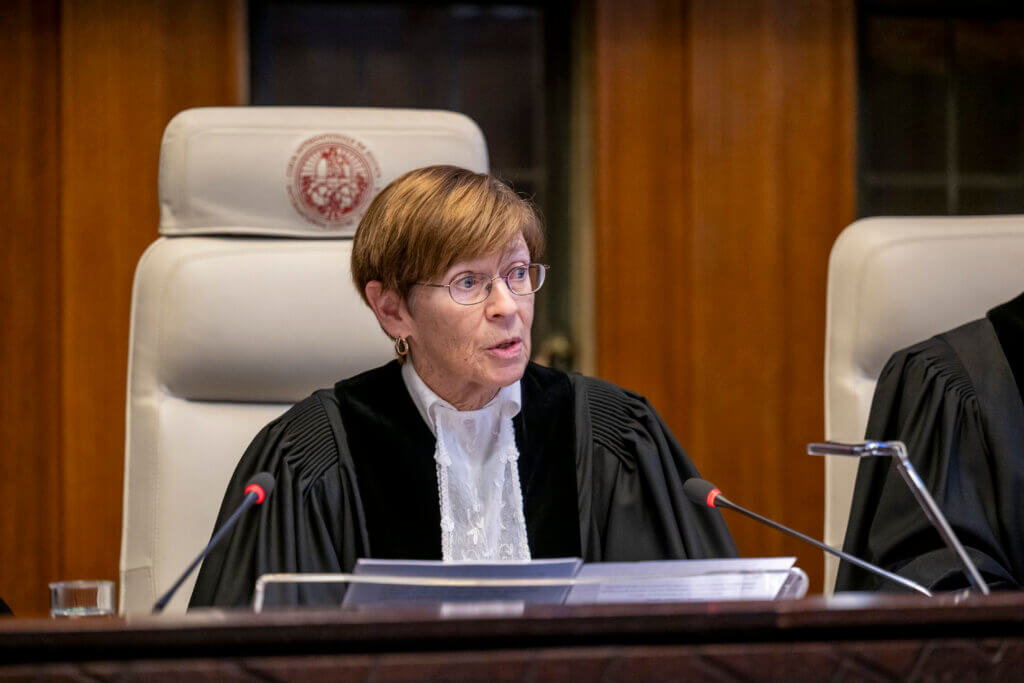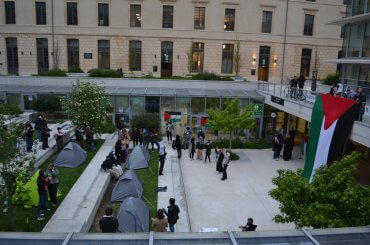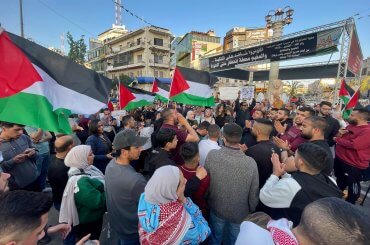Speaking on behalf of the World Court’s 17 justices, two of them ad hoc (from South Africa and Israel), President Joan Donoghue delivered the court’s response to South Africa’s application against Israel under the 1948 Genocide Convention and its request for an urgent injunction – ‘provisional measures,’ in legal jargon, against Israel.
Donoghue delivered a withering summary of the situation Gaza’s 2.3 million people face after sixteen weeks of unrelenting Israeli violence, featuring acts plausibly defined as genocidal under Article II of the 1948 Genocide Convention.
In her 45-minute presentation to a packed chamber of attorneys and diplomats, President Donoghue quoted a host of senior UN sources, UN Special Rapporteurs and the UN Secretary General himself, describing a situation in Gaza that looks, sounds and smells like genocide.
She also quoted statements by Israeli Defense Minister Yoav Gallant, Israeli President Isaac Herzog, and other senior Israeli officials that South Africa argues are genocidal.
After a detailed review of the procedural requirements for the court to ‘indicate preliminary measures’ (an injunction of sorts) – all of which were met in South Africa’s application, she confirmed – Judge Donoghue read out a half dozen preliminary measures the court expects Israel to carry out as state party to the 1948 Genocide Convention. Four of the six measures passed by a vote of 15-2. Two passed by a vote of 16-1.
Israel, Judge Donoghue announced, must:
1) take all measures to ensure that acts deemed genocidal under the Genocide Convention do not take place in Gaza;
2) ensure that its military does not commit genocidal acts;
3) prevent and punish genocide incitement and rhetoric;
4) enable and facilitate the provision of basic services and humanitarian assistance to the people of Gaza;
5) prevent destruction and preserve evidence of genocide in its military operations, and
6) report to the court within one month, informing the court of its compliance with today’s preliminary measures order, and in response to South Africa’s genocide complaint.
The court did not instruct Israel to suspend its military operations in the besieged enclave, however, as South Africa had requested in its application.
In its meticulously detailed, 84-page application to the ICJ instituting proceedings against Israel under the Genocide Convention, South Africa had asked the court, pending its determination of the facts underlying its charges (something that will take years), to instruct Israel to “immediately suspend its military operations in and against Gaza.”
Israeli lawyers may think they dodged a bullet at the International Court of Justice today in The Hague because the court neglected to do so. But they have little reason to celebrate, and they know it.
Today’s preliminary measures order definitely leaves Israel on the hook in The Hague, and under the gun internationally. Under the 1948 Genocide Convention, the Convention’s 153 state parties “undertake to prevent” genocide before it actually occurs or reaches full scale. South Africa stressed this point in a ‘Note Verbale’ to Israel on December 21, a week before filing its application to the court.
“[As] a State Party to the Convention,” South Africa’s note stated, “South Africa is under a treaty obligation to prevent genocide from occurring.”
Across the Global South (where almost half of the ICJ’s judges come from), the Genocide Convention’s crucial injunction to nip genocide in the bud, at its earliest stages, will resonate among Palestine’s friends. Today’s preliminary measures order will likely provide them with grounds for imposing economic and diplomatic sanctions on Israel.
Mondoweiss contacted legal scholars for their views on today’s court ruling.
“It’s a groundbreaking decision,” says Giulia Pinzauti, Assistant Professor of Public International Law at Leiden University. “Even if they didn’t order all of the measures that were requested by South Africa, they were significant measures, and they recognized that South Africa has a plausible case regarding Israel regarding the commission of genocide, and that the situation demands urgent measures, and within two weeks or so the court handed down its order. It’s a very significant step.”
“I think it’s a very great achievement for South Africa,” Canadian genocide scholar William Schabas told Mondoweiss. “If the court didn’t think that there was a serious situation, it wouldn’t have made such an order. I think the other remarkable thing about it is how unanimous it is.”
Although a court-ordered ceasefire topped South Africa’s list of requested provisional measures, its absence from today’s court ruling doesn’t trouble Pinzauti or Schabas.
“[Israel] had some cause for a response following the 7th of October,” Schabas told Mondoweiss, “so ordering it to halt all military activity when missiles have been fired into Israel from Gaza, it’s asking an awful lot of the court to make such an order.”
“Even if they didn’t order the suspension of military operations,” Pinzauti told Mondoweiss, “I think in practice, for Israel to abide by the order and take the measures that were ordered by the court, in practice, they’ll have to scale down on their military operations because otherwise there’s no other way for them to take effective measures to ensure the provision of basic services, humanitarian assistance, and refrain from carrying out acts like killing, infliction of conditions of life calculated to destroy, prevention of births. I’m wondering if they’re calling for a ceasefire without calling for a ceasefire.”
And today’s court decision will have consequences for Israel — perhaps even at the UN Security Council.
“I wouldn’t rule out the possibility of a Security Council resolution,” Schabas told Mondoweiss. “Given the unanimity, the near unanimity of the decision, I don’t think it’s out of the question that there could be a Security Council resolution, perhaps with a few abstentions. Maybe the U.S. and the UK would abstain in such a resolution, but they would let it through. If I were a member of the Security Resolution, I would be busy drafting a resolution that would take this order into account.”
Anticipating U.S. reaction
Given the possibility of a U.S. veto, the Security Council – nominally responsible for enforcing ICJ decisions – will almost certainly remain paralyzed. But some observers suggest the Biden Administration could look for a reason to ‘get tough’ with its client state.
The U.S. also wants to be seen as supportive of the ICJ. Washington depends on the World Court when it suits its purposes (e.g., Ukraine v. Russia) and will be compelled to acknowledge the legitimacy of the preliminary measures issued by the court today.
So will Israel’s other Western allies.
In mid-November, likely unaware of South Africa’s upcoming submission to the court, Canada, Denmark, France, Germany, the Netherlands, and the UK filed a joint submission to the ICJ regarding The Gambia v. Myanmar genocide case now before the court. The six Western powers recommended that the court broaden its ‘construction’ of the Genocide Convention, taking into account the “serious bodily or mental harm” armed conflict verging on genocide inflicts on children and the role of forced displacement in gathering genocides.
“[The] targeting of children provides an indication of the intention to destroy a group as such, at least in part,” the six states told the court.
Had they known South Africa was about to file a genocide application against Israel – an application liable to be strengthened by their own recommendation to the ICJ – they may well have opted to remain silent, Schabas told Mondoweiss.
As Israel’s allies and critics digest the enormity of today’s preliminary measures ruling in The Hague, those measures will likely encourage UN institutions to apply pressure on Israel.
Other UN avenues
Much more likely than the Security Council to act — the Committee on the Elimination of Racial Discrimination (CERD), arguably the most powerful of the UN rights system’s ten treaty-based bodies.
Since 2018, CERD has been addressing a complaint lodged by Palestine against Israel under Article III of the CERD treaty, charging Israel with institutionalized racism and apartheid. That complaint is now at a ‘conciliation’ stage. Israel is refusing to participate. Conciliation thwarted, CERD’s final step will be to issue a ruling on the merits of Palestine’s position. The drift of its ruling — tempting to predict — stands to be hastened by today’s preliminary measures order.
One week before South Africa’s genocide application to the ICJ, CERD filed a public statement under an unusual ‘Early Warning and Urgent Action Procedure’, drawing ties between alleged Israeli apartheid and genocide in Gaza.
CERD knows its history. From Nazi Germany to Rwanda, the former Yugoslavia and Myanmar, institutionalized racism, hate speech and discrimination easily morph into genocide, especially in the context of ‘anti-terrorism’ campaigns and armed conflict.
Citing “racist hate speech” and “dehumanizing rhetoric” by top Israeli government and public figures, and “serious concerns regarding the obligation of Israel … to prevent crimes against humanity and genocide,” CERD called on Israel to institute a ceasefire in Gaza, and to respect its obligations under both the CERD and Genocide Conventions.
In its preliminary measures application to the ICJ, South Africa referred to both CERD’s statement and the organic relationship between Israeli genocide and apartheid. And in today’s preliminary measures ruling, the court cited CERD.
“[Acts] of genocide inevitably form part of a continuum,” South Africa’s application stated. “For this reason, it is important to place [alleged acts of Israeli genocide] in the broader context of Israel’s conduct towards Palestinians during its 75-year-long apartheid … and other war crimes and crimes against humanity.”
Indeed, South Africa’s genocide application “could be read as a kind of phantom application pertaining to apartheid,” legal scholars Victor Kattan and Gerhard Kemp write in an academic article published yesterday.
Diplomatic and legal fallout
Today’s preliminary measures order is binding – in theory – but the court has no means to enforce it. Israel will likely ignore it, as it did the ICJ’s landmark Wall ruling, in 2004.
But the reputational damage and diplomatic fallout arising from this afternoon’s preliminary measures order in The Hague can only grow.
Shortly before Israel files its ICJ-ordered progress report on February 19, the court will launch into a previously scheduled week of Advisory Opinion hearings on the ‘legal consequences’ arising from Israel’s 57-year occupation of the West Bank, East Jerusalem and Gaza, as requested by the UN General Assembly.
Among the international crimes Israel is charged with in the hundreds of pages of documents submitted by the General Assembly to the UN’s top court – acquisition of territory by force, settler-colonialism, de facto annexation, denial of the right to self-determination, persecution, and apartheid.
And genocide.
Israel may think it dodged a bullet this morning in The Hague. A volley of legal missiles is heading its way.



Whole world is watching
Thanks for this very enlightening commentary by David Kattenburg on this morning’s ruling by the ICJ.
An internet search on the ICJ’s decision did not produce any other articles nearly so illuminating.
In legal terms it was a good outcome. They did not call for a ceasefire but the Israelis had already stated they would ignore it anyway so no point. This is more powerful. Israel is being investigated further and is under strict instructions, which, if ignored, will bring severe repercussions. It is obvious the Israelis know the magnitude of their loss given their hysterical and ridiculous claims of anti-semitism.
What they fail to understand, and they fail to understand much at all, is that the world is watching their genocide and everytime they cite the Jewish experience of holocaust and cry anti-semitism, most people, including growing numbers of Jews simply feel sickened at their hypocrisy and lies.
In short, time to put away the holocaust and anti-semitic tropes and end the holocaust, the genocide and the occupation of Palestine.
Where’s the discussion on what the Palestinians were ordered to do, to release the hostages? Everyone knows they will ignore it, why do expect consequences for Israel when it will be the Palestinians failing to comply?
Good article in today’s NYT on South Africa’s role in the case:
https://www.nytimes.com/2024/01/26/opinion/south-africa-israel-genocide.html